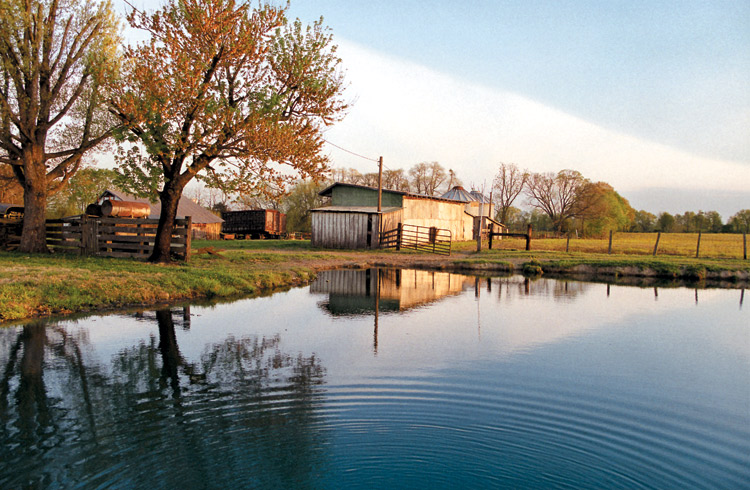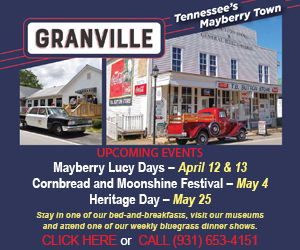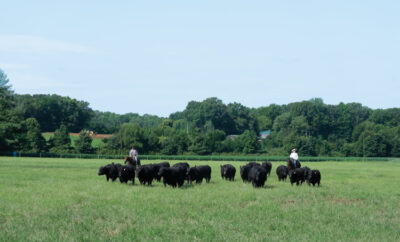Forever Farmland: Land Trust Saves Farms From Development
Teenager John Kermit Laughrey and his younger brother, Harris, are passionate about their family’s 1829 farm in McKenzie. In fact, the two boys say they’re determined to never see a housing development on the land.
So the farm’s sixth generation wholeheartedly backed their mother, uncle and grandparents in the decision to donate a conservation easement to the Land Trust for Tennessee – guaranteeing that even if the family sells the 200-acre tract, the buyer could not build houses or businesses.
Money Isn’t Everything
The Laughreys don’t care that if they ever decide to sell the farm, it will bring much less money. The farm appraised at more than $750,000 for development, compared to about $200,000 as farmland.
“I never thought about the money. I love this farm a whole bunch. I could never see it developed,’’ says John Laughrey, 17, as he takes a break from clearing a fence row. “I see myself coming back as a part-time job.”
Harris Laughrey, 14, agrees, even though his future plans include law school.
“There’s so much history. Every year we hear more stories, and one day we’ll pass those on to our own children,’’ he adds.
“I don’t think I would farm full time, but our cousin and my brother would be here. We’ll all help out together.’’
The Carroll County cattle farm is mainly worked these days by the boys’ grandfather, Kermit Holland, age 92, and his wife, Nancy; the boys’ mother, Jill Holland; and their uncle, Jack Holland. Land for row crops is leased to another farmer.
“We practically got down on our knees and begged the Land Trust to take us,’’ says Jill Holland, who kept her maiden name when she married. “I think people thought that when my parents were gone, my brother and I would sell out immediately – that there were dollar signs in our eyes.
“But keeping this land in agriculture or conservation has always been a priority in our family.’’
Land Trust Expands to West Tennessee
The West Tennessee farm was a new venture for the nonprofit Land Trust, which has primarily worked in Middle Tennessee since its founding in 1999, according to Jean Nelson, president and executive director.
“We’re looking to be responsive to other parts of the state when we can,’’ Nelson says. Since 1999, 5,557 acres have been protected by donated conservation easements in Tennessee.
In light of their expansion goals, the Land Trust is mapping out a three- to five-year strategic plan and has opened a satellite office in Monteagle to serve the South Cumberland Plateau and Sequatchie Valley. The trust formed a partnership with The Lands of Boone and Crockett, a nonprofit group, and raised the funds needed to hire a staff person for Carter, Greene, Johnson, Sullivan, Unicoi and Washington counties.
“I would say we’ve had 25 to 30 farmers express interest,’’ Roy Settle – coordinator of the Appalachian Resource, Conservation and Development Council of the USDA – says of the East Tennessee effort. “Some of these farms have been in one family for 200 years. People are giving up thousands of dollars if they were to sell the land for development, but that’s not the important thing to them. Their connection with the land and what it has meant to them over the generations is more important than that.’’
More and more landowners are seeking easements, Nelson says.
“Getting the word out is the critical factor. As people with farms see what others have done, we get more calls,’’ she says. “And the farm population is getting older, which prompts people to look more carefully at what will happen when their children face what to do with the farm.’’
Although 16 land trusts operate in Tennessee, the Land Trust for Tennessee is the only one chartered to work statewide and with the primary goal of protecting farmland.
That’s a pressing need, since the American Farmland Trust ranked Tennessee eighth in the nation for loss of prime farmland from 1992 to 1997, the latest figures available.
“We have great land and great farmers in Tennessee. We don’t know what’s going to happen in the future. We may need to be able to feed ourselves. We need to have land available that young farmers can afford to farm,’’ says Eileen Hennessy, program director for the Land Trust.
Hennessy stresses that the landowner drives the easement.
“We keep land available for agriculture. We don’t make you farm it for the next 150 years,’’ she says. And, the easements can take into account all kinds of personal needs. For instance, a farmer who thinks a son or daughter might one day move back to the farm can specify that one or two houses can be built at a later date.
The property tax breaks for easements are less in Tennessee than in other states; greenbelt laws already protect farms from higher taxes. But Hennessy says there can be income tax benefits, since the difference between the land’s appraised value as farmland and its value as development property is considered a charitable deduction, Hennessy says.
Conservation Takes Patience
Donating a conservation easement can take a long time.
Susan McCall Fisher says it took several years to donate her 264-acre farm in Bethesda.
“The Land Trust people are fantastic, but they had an influx of owners who want to protect their land, and they have a small staff,’’ Fisher says. “There are a lot of people whose voices have to be heard. You have to consult with wildlife management; you have to have a lawyer.’’
After she began working with the trust, Fisher learned that her 84-year-old neighbor, Elizabeth Crunk, still an active farmer, had done the same thing.
“Because of that, instead of our 264 acres, there’s more like 500 acres protected,’’ Fisher says.
Nancy Holland says she’ll never regret donating the land, even though the income tax breaks may not even cover the stewardship donation her family gave to the Land Trust to see that the easements are enforced in years to come.
“We had a signing party. You don’t know the relief that we felt. It was wonderful to know that it is finally done,’’ she says.
“This is going to be forever farmland.”
Landowners Retain Many Rights
The landowner can still sell the property, but the buyer must follow the easement restrictions. For example, if the easement prohibits development, any new owner cannot build a factory.
The landowner can continue farming, or harvesting and managing timberland. They can hunt or restrict hunting as they wish. They can transfer property to their heirs, or restrict public access to the property.
While easements restrict the right to subdivide and develop the property, a landowner can stipulate in the easement that a limited number of buildings can be allowed in the future.
FAQs on Land Trusts
What is a land trust?
This nonprofit organization is chartered to protect land through several tools, including conservation easements – voluntary restrictions a landowner places on the future use of property to protect agricultural land, wetlands, forests, wildlife habitat, scenic landscapes, or land around historic sites or buildings.
How much does it cost?
Landowners are not charged a fee, but the Land Trust for Tennessee asks those who donate conservation easements to consider contributing to the Stewardship Fund. The money is used to pay the costs of annual monitoring and in preparation for defending against legal challenges.
Other costs the landowner may expect include fees from an appraiser, a surveyor, an attorney to review the easement draft and an accountant to look into tax implications.
How can I learn more?
Contact the Land Trust for Tennessee at 615-244-LAND (5263), or visit their Web site at www.landtrusttn.org.
















id hate 2 c all th farm land near my home be destroyed
[…] Download Image More @ tnhomeandfarm.com […]